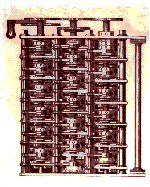
![]()
 Absinthe - A highly toxic liqueur, 140 to 160 proof, illegal in
most countries, flavored with wormwood and other herbs. Effects
include those customary with alcohol, plus a disorienting, floating,
dream-like quality from the combination of wormwood and herbs.
Absinthe - A highly toxic liqueur, 140 to 160 proof, illegal in
most countries, flavored with wormwood and other herbs. Effects
include those customary with alcohol, plus a disorienting, floating,
dream-like quality from the combination of wormwood and herbs.
![]()
![]() About Absinthe
About Absinthe
Aesthetic Movement - A literary and artistic movement that flourished in the 1880s, heavily influenced by the Pre-Raphaelites, that proposed a sentimentally archaic ideal of beauty. The young Oscar Wilde was closely identified with it, and his dress and affectations were ridiculed and parodied by Punch and, more gently, by Gilbert and Sullivan.
Agnosticism - The philosophical belief that knowledge of God is
impossible because of the inherent, insuperable limitations of
the human mind. The term was coined by T.H. Huxley about 1870,
who, though not the concept's originator, was perhaps its most widely known champion in the latter half of the 19th century.
![]()
![]() Huxley and agnosticism
Huxley and agnosticism
![]()
![]() Huxley on agnosticism
Huxley on agnosticism
 The Alamo - The scene of a heroic defense in the war for Texan
independence from Mexico. Manned by fewer than 200 Texans, it
was besieged on February 24, 1836 by 3000-4000 Mexican troops
lead by General Antonio López de Santa Anna. Col. James Bowie
and his co-commander William. B. Travis gave a victory-or-death
order, and the Texans held out for 13 days, during which about
500 of the attacking force was killed. Breaching the walls on
March 6, the Mexicans overpowered and slaughtered most of the
garrison in hand-to-hand struggle. Five survivors were later killed
in cold blood by order of Santa Anna. Report of the massacre stiffened
Texan resistance, under the rallying cry, "Remember the Alamo."
The Alamo - The scene of a heroic defense in the war for Texan
independence from Mexico. Manned by fewer than 200 Texans, it
was besieged on February 24, 1836 by 3000-4000 Mexican troops
lead by General Antonio López de Santa Anna. Col. James Bowie
and his co-commander William. B. Travis gave a victory-or-death
order, and the Texans held out for 13 days, during which about
500 of the attacking force was killed. Breaching the walls on
March 6, the Mexicans overpowered and slaughtered most of the
garrison in hand-to-hand struggle. Five survivors were later killed
in cold blood by order of Santa Anna. Report of the massacre stiffened
Texan resistance, under the rallying cry, "Remember the Alamo."
![]()
![]() A San Antonio view of the Alamo
A San Antonio view of the Alamo
![]()
![]() A Mexican view of the Mexican-American War (a decade later)
A Mexican view of the Mexican-American War (a decade later)
![]()
![]() Frederick Engels: Sobre la guerra entre México y Estados Unidos
Frederick Engels: Sobre la guerra entre México y Estados Unidos
Sir Rutherford Alcock (1809-1897) - British consul and diplomat. In 1858 he was appointed consul general to the newly opened empire of Japan, and in 1859 appointed minister plenipotentiary. In 1860 Alcock's Japanese interpreter was murdered at the gate of the legation, and in 1861 the legation was stormed by a body of ronin, who were held off by Alcock and his staff. Alcock pressed for protection of Westerners from Japanese radicals eager to expel them and overthrow the Tokugawa shogunate. He arranged for British, Dutch, American and French ships to bombard offshore batteries of the Choshu domain in Shimonoseki. After retiring from goverment service in 1871, he was for some years president of the Royal Geographical Society.
 Analytical Engine - A mechanical calculating machine, conceived
of by Charles Babbage in 1833, but never built. It occupied much
of his attention for the rest of his life. It represented a conceptual
advance over the Difference Engine, as it was designed to perform
any arithmetic operation, and to string many such operations together.
It stored instructions for the operations on coded punched cards,
in the same way a Jacquard loom stores instructions. In principle,
it could solve any conceivable arithmetic problem. Conceptually,
it was a forerunner of the modern digital computer, although,
because of its mechanical nature, it would have been many millions
of times slower.
Analytical Engine - A mechanical calculating machine, conceived
of by Charles Babbage in 1833, but never built. It occupied much
of his attention for the rest of his life. It represented a conceptual
advance over the Difference Engine, as it was designed to perform
any arithmetic operation, and to string many such operations together.
It stored instructions for the operations on coded punched cards,
in the same way a Jacquard loom stores instructions. In principle,
it could solve any conceivable arithmetic problem. Conceptually,
it was a forerunner of the modern digital computer, although,
because of its mechanical nature, it would have been many millions
of times slower.
![]()
![]() The history of computation: Babbage, Boole, Hollerith
The history of computation: Babbage, Boole, Hollerith
![]()
![]() John Walker's virtual museum of the Analytical Engine
John Walker's virtual museum of the Analytical Engine
 Anomalcaris - Creature found in the Burgess shales of British Columbia, now reconstructed as a half-meter-long ray or squid-like creature, with a mouth composed of a circle of toothed plates
that irised open like a Heinlein door.
Anomalcaris - Creature found in the Burgess shales of British Columbia, now reconstructed as a half-meter-long ray or squid-like creature, with a mouth composed of a circle of toothed plates
that irised open like a Heinlein door.
![]()
![]() A ray-dreamt anomalcaris at Cambian Park
A ray-dreamt anomalcaris at Cambian Park
![]()
![]() Anomalcaris at the National Museum of Natural History
Anomalcaris at the National Museum of Natural History
Apatosaurus - See Brontosaurus.
Apophenia - The spontaneous perception of connectedness and meaningfulness in random phenomena: seeing patterns and connections where none exist. To experience it, stare at a television tuned to a dead channel, or keep watching the skies. See also: The Dr. Bronner Effect.
![]()
![]() Wm. Gibson and apophenia.
Wm. Gibson and apophenia.
Axminster carpet - One of several types of machine-made carpets;
a Jacquard card mechanism controls the design.
![]()
![]() A brief history of English carpets
A brief history of English carpets

The Difference Dictionary was first published
in slightly different form in Science Fiction Eye, Issue #8.
Text copyright 1990, 1996, 2000, 2003,
by Eileen K. Gunn.


